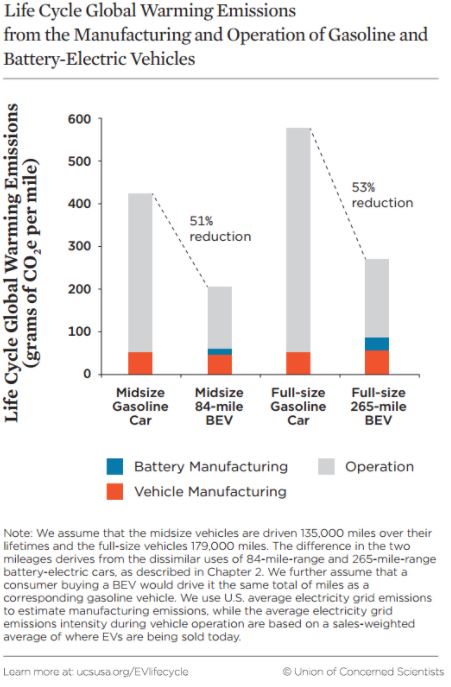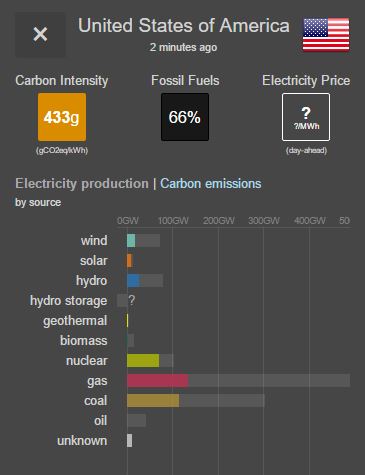WetEV
Well-known member
oilerlord said:As I mentioned earlier, the initial manufacturing CO2 emissions happen regardless of what you car you buy.
The perfect is the foe of the good.

oilerlord said:As I mentioned earlier, the initial manufacturing CO2 emissions happen regardless of what you car you buy.
SeanNelson said:While I agree with what you're saying, I feel I should point out that there are CO2 emissions from making, transporting and installing solar panels and their ancillary equipment as well - so the same concepts apply as the ones you are describing for cars.
WetEV said:oilerlord said:As I mentioned earlier, the initial manufacturing CO2 emissions happen regardless of what you car you buy.
The perfect is the foe of the good.
oilerlord said:SeanNelson said:While I agree with what you're saying, I feel I should point out that there are CO2 emissions from making, transporting and installing solar panels and their ancillary equipment as well - so the same concepts apply as the ones you are describing for cars.
I mentioned that earlier in this thread too, as it was the basis behind the premise of this thread. On a solar panel forum, It was argued that solar panels are not green because CO2 is released during their manufacturing process. The significant difference between a solar panel and an EV however is that a solar panel will offset it's initial CO2 footprint within 2-3 years, and will continue to so for decades. An EV simply releases less (grid) CO2 over it's lifetime.
oilerlord said:WetEV said:oilerlord said:As I mentioned earlier, the initial manufacturing CO2 emissions happen regardless of what you car you buy.
The perfect is the foe of the good.
Either you want to be reasonably accurate and honest about calculating your own individual / household CO2 footprint, or not. It isn't about being perfect.
WetEV said:Nice of you to claim that I'm dishonest.
GetOffYourGas said:I fail to see the difference. Solar Panels only "offset" anything because they replace a power source that pollutes. Same as an EV replacing and ICEV.

The key issue here is where the responsibility for grid emissions lies - does it lie with the user of the power produced by the grid or does it lie with the grid itself. Placing it with the user can be problematic because (a) it reduces the incentive for the user to switch to a cleaner source of power (and one which can become even cleaner over time), and (b) the user is not in a position to upgrade the grid. Perhaps at least some of the blame for grid emissions more properly belongs with those who operate it because they're the ones who can do something about it.oilerlord said:The difference is that grid emissions aren't (typically) zero. Look at this comparison graph again:
While EV's have zero local emissions, grid emissions still apply. To your point, a solar panel replaces a power source that pollutes. While electricity replaces gasoline, grid emissions still occur when you use the grid to charge your EV's battery. As such, an 84 mile EV emits 51% less CO2 over its lifetime than a comparable ICEV does (as shown above). Perhaps one day, the entire power grid will be 100% clean.
oilerlord said:GetOffYourGas said:I fail to see the difference. Solar Panels only "offset" anything because they replace a power source that pollutes. Same as an EV replacing and ICEV.
The difference is that grid emissions aren't (typically) zero.
GetOffYourGas said:However, it has been shown that grid emissions are less than ICEV emissions. So much so, that the manufacturing difference can be overcome with as little as 5,000 miles!

GetOffYourGas said:I would argue that something could be considered "Green" if it harmed the environment significantly less than the standard alternative (say BEVs vs ICEV, or Solar Panels versus a NG plant).
oilerlord said:EVs consume electricity. Electricity generation releases CO2 from burning coal & natural gas.
No, there is no difference. It's like this:oilerlord said:There is a key difference between "offsetting" emissions, and "less" emissions. [. . .] A solar panel generates energy without emitting CO2, so by design it offsets CO2.
WetEV said:Let me fix that for you.
Electricity generation might release CO2 from burning coal & natural gas.
Seattle city is 97+% hydro, nuclear and wind.
http://www.seattle.gov/light/FuelMix/
British Columbia is 90+% hydro, they don't have electric bills, they have hydro bills.
Ontario was running 1% fossil fuel when I wrote this. Nuclear, hydro and wind supplied the bulk.
France was running 2% fossil fuel when I wrote this. Nuclear, solar, hydro and wind supplied the bulk.
Sweden was running 3% fossil fuel. Hydro, nuclear and wind.
100% is very doable, Seattle goes months on 100% non-fossil, with small fractions of fossil power mostly in later summer and fall, when hydro is lower.
Electric power does not need fossil fuels.
wwhitney said:No, there is no difference. It's like this:
You (or I) choose to own and use a car to get around. You can choose an ICEV, or an EV. Choosing an EV will result in less CO2 emissions for your car. You could, of course, choose to use a bicycle instead, and then you'd have no automotive CO2 emissions.
This is the part of your statement that I disagree with. A solar panel doesn't offset CO2, it just produces electricity without an ongoing CO2 footprint. It is similar to an EV that is charged from CO2 free sources--both produce useful consumables without ongoing CO2 emissions. [Well cars use tires as a consumable, so there would still be a CO2 footprint from the tires, not sure if that is significant.]oilerlord said:A solar panel generates energy without emitting CO2, so by design it offsets CO2.
oilerlord said:wwhitney said:No, there is no difference. It's like this:
You (or I) choose to own and use a car to get around. You can choose an ICEV, or an EV. Choosing an EV will result in less CO2 emissions for your car. You could, of course, choose to use a bicycle instead, and then you'd have no automotive CO2 emissions.
Other than stating the obvious, that we all have choices in our lives...how does that change the fundamental principals of addition & subtraction? Did I miss a step in the math somewhere calculating typical CO2 per kWh?
oilerlord said:GetOffYourGas said:However, it has been shown that grid emissions are less than ICEV emissions. So much so, that the manufacturing difference can be overcome with as little as 5,000 miles!
There is a key difference between "offsetting" emissions, and "less" emissions. This is the crux of the matter that I think you're missing. Yes, the manufacturing difference can be overcome in as little as 5,000 miles - vs gasoline. Again, an EV cannot offset CO2, because by design, it consumes energy just like any car does. A solar panel generates energy without emitting CO2, so by design it offsets CO2.
EVs consume electricity. Electricity generation releases CO2 from burning coal & natural gas. In the US, the average is 433 g of CO2 per kWh (Note, map updates in real-time. The reading below was recorded at approx 10:30PM MST).

https://www.electricitymap.org/?wind=false&solar=false&page=country&countryCode=US
We can then do the math for how much CO2 is released in our EV's. A Chevy Bolt has a 60 kWh battery, thus it releases about 26 kg of CO2 based on 238 EPA miles (60 kWh X 433 g = 25.98 kg). Driving the car more, simply releases more CO2. After 5,000 miles, a Chevy Bolt will have released 545 kg of CO2. That's certainly less than a comparable gasoline vehicle, but an EV doesn't somehow clean the air as you drive...again, it simply emits less emissions due to the efficiency of the grid vs the relative inefficiency of the internal combustion engine.
GetOffYourGas said:I would argue that something could be considered "Green" if it harmed the environment significantly less than the standard alternative (say BEVs vs ICEV, or Solar Panels versus a NG plant).
Referring to my first post; are EVs "green"? Pop culture would describe an Escalade Hybrid as green, but can we really call a monster 6000 lb vehicle "green"? Clearly, a Toyota Camry burning gasoline could be considered "more" green because it returns 40 mpg. That opens the door to ambiguity, and suddenly that Escalade Hybrid is parked in your EV charging space - when you really need a charge because the owner really does believe that their car is green.
Here is the Merriam-Webster definition of "green" again:
c : tending to preserve environmental quality (as by being recyclable, biodegradable, or nonpolluting)
Are hybrids and EVs "nonpolluting"? By definition, no. They pollute less.
SparkEVPilot said:A gallon of gasoline burned in an ICE vehicle produces 19.64 lbs of CO2. If you live in PG&E territory, as I do, generating 1 kWh of electricity produces 0.524 lbs of CO2.
Doing a little math:
1. If your combined EPA mileage for your ICE vehicle is 30 mpg, your would produce .654 lbs of CO2 per mile.
2. If your EV averages 5.0 mi / kWh and you live in PG&E territory, the power you use to go a mile would be equivalent to .105 lbs of CO2 per mile. The ICE vehicle burning gasoline produces 6.23 times more CO2 per mile than the EV.
Said another way, the ICE vehicle would need to have a combined EPA mileage of 187 MPG to match the EV at 5.0 mi / kWh for CO2 production per mile. I think I would be more concerned with the amount of CO2 my natural gas burning furnace uses in the winter. Natural gas produces 13.446 lbs of CO2 per therm burned [PG&E].
Enter your email address to join: